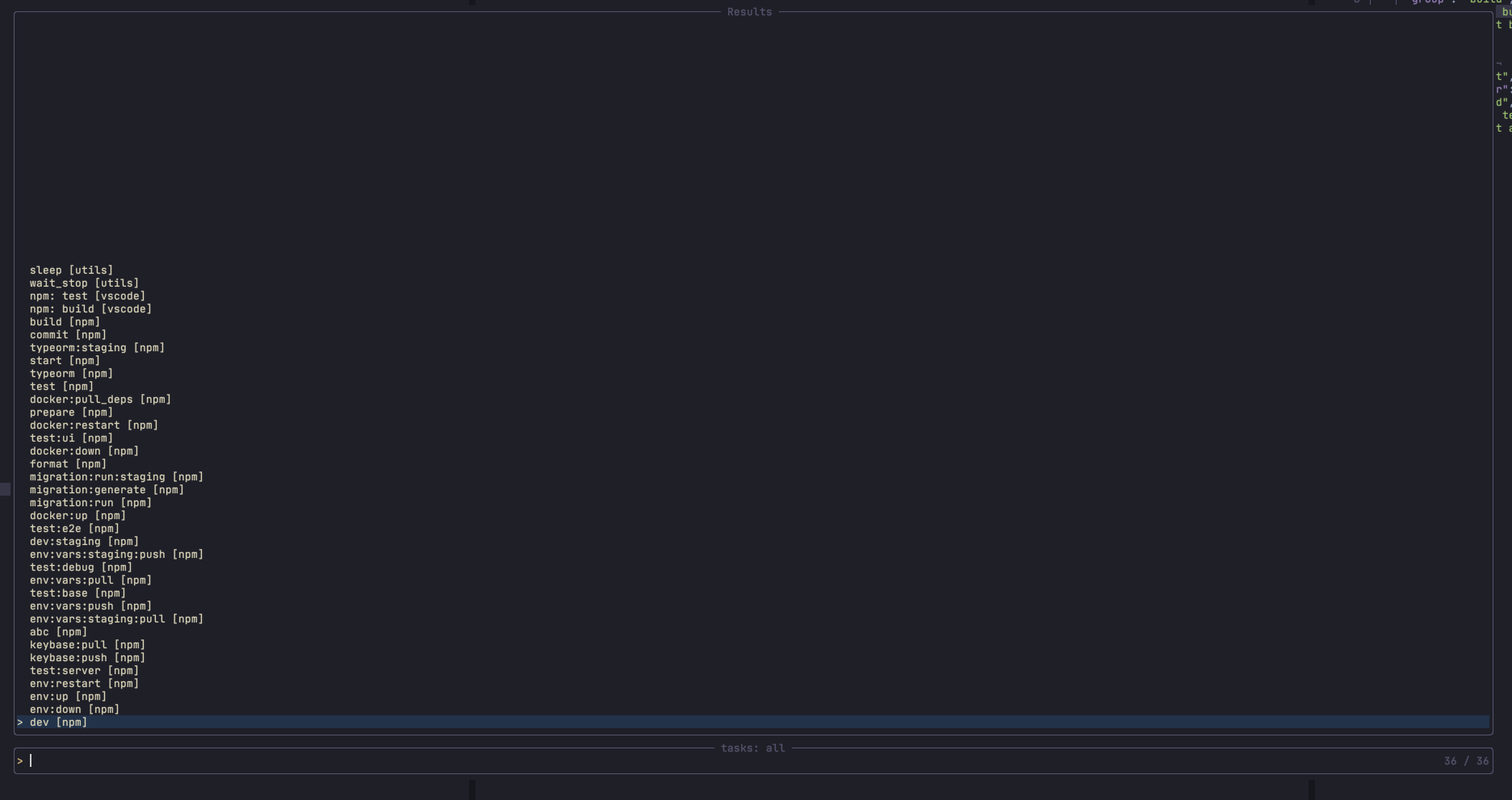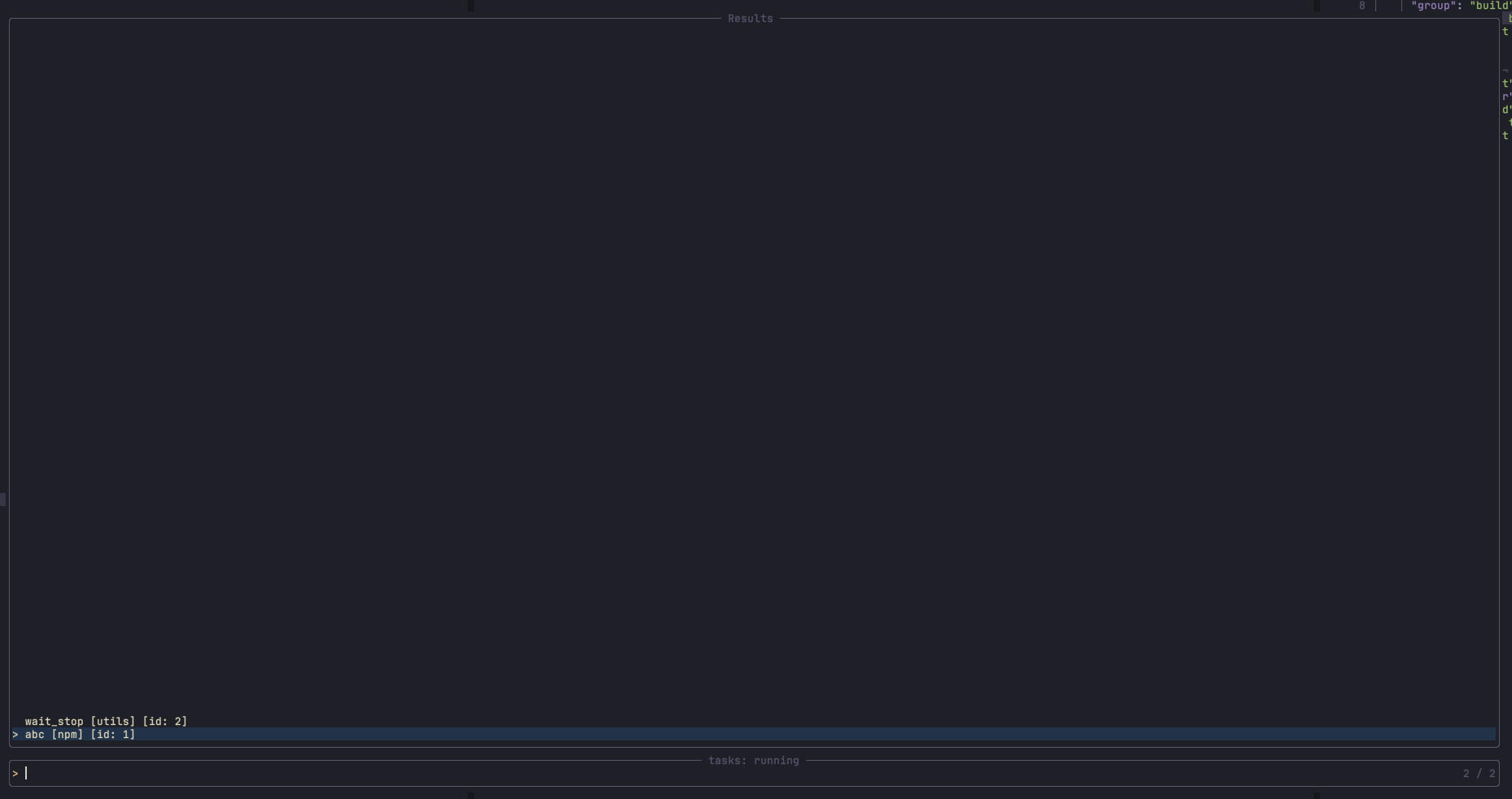Alpha
Dependencies:
Neovim versions:
0.7.2nightly
With Packer:
use({ "GustavoKatel/tasks.nvim", requires = { "nvim-lua/plenary.nvim" } })Calling setup is not mandatory
Example:
local tasks = require("tasks")
local source_npm = require("tasks.sources.npm")
local source_tasksjson = require("tasks.sources.tasksjson")
local builtin = require("tasks.sources.builtin")
require("telescope").load_extension("tasks")
tasks.setup({
sources = {
npm = source_npm,
vscode = source_tasksjson,
utils = builtin.new_builtin_source({
sleep = {
fn = function(ctx)
local pasync = require("plenary.async")
pasync.util.sleep(10000)
end,
},
vim_cmd = {
vcmd = "echo 'ok'"
},
shell_cmd = {
cmd = "make test"
}
}),
},
})
the builtin source is just a place holder to allow you to define custom task specs using lua functions, vim commands or shell commands.
It will load all package.json scripts from the project root to be used as task specs.
It will load all tasks from .vscode/tasks.json to be used as task specs.
There are bunch of things missing from the schema, I believe it's enough to get started. Please open an issue if you think any of the missing features should be added.
The builtin runner is a generic runner that allows you to run lua functions, vim commands or shell commands (using the terminal :e term://...)
It's always available, even if you don't specify in your config.
A very minimal custom runner that runs lua functions (async functions) can be created as such:
local Task = require("tasks.lib.task")
local tasks = require("tasks")
tasks.setup({
...
runners = {
custom_runner = {
create_task = function(self, spec, args)
return Task:new(spec.fn, args)
end
}
},
sources = {
my_tasks = builtin.new_builtin_source({
sleep = {
fn = function(ctx)
local pasync = require("plenary.async")
pasync.util.sleep(10000)
end,
-- this prop will route this task to the custom runner
runner_name = "custom_runner"
},
}),
}
})You can specify a router function to better match specs with runners. This will override the runner_name in the specs.
tasks.setup({
runners = { ... },
sources = { ... },
router = function(spec_name, spec, args, source_name)
-- this will run all specs from the `npm` source in runner with name `my_custom_runner`
if source_name == "npm" then
return "my_custom_runner"
end
return nil -- fallback to use the default router value
end
}):Telescope tasks specs
Shows all the available specs from all sources.
The default action will create and run a new task.
:Telescope tasks running
Shows all current running tasks.
The default action will request the task to stop (call task:request_stop()).
local tasks_section = require("sidebar-nvim.sections.tasks")
local sidebar = require("sidebar-nvim")
sidebar.setup({
...
sections = { tasks_section }
...
})Minimal integration for lualine
lualine.setup({
...
sections = {
lualine_c = {
require("tasks.statusline.running")("<custom_icon or prefix>")
}
}
...
})Run the first spec with name spec_name additionally passing extra args in args
You can also pass source_name to refine the search and only run specs from that source.
Returns task_id and a task table (Task)
Re-run the last spec with the same args passed in the last call to tasks.run
Returns task_id and task table
Get all the available specs. Optionally filter by spec name spec_name and runner name runner_name.
Returns dictionary
Example of return value:
{
["my_source"] = {
["spec_1"] = {
...
},
["spec_2"] = {
...
}
},
[<source_name>] = {
[<spec_name>] = <spec>
}
}Get all the tasks currently running. Optionally filter by spec name spec_name and runner name runner_name.
Returns dictionary
Example of return value:
{
[1] = <task>,
[2] = <task>,
...
[<task_id>] = <task>
}A task object has a few helper methods.
Returns the current task state, which can evolve from ready -> running -> done.
Signal the underlying job that this task should be cancelled.


